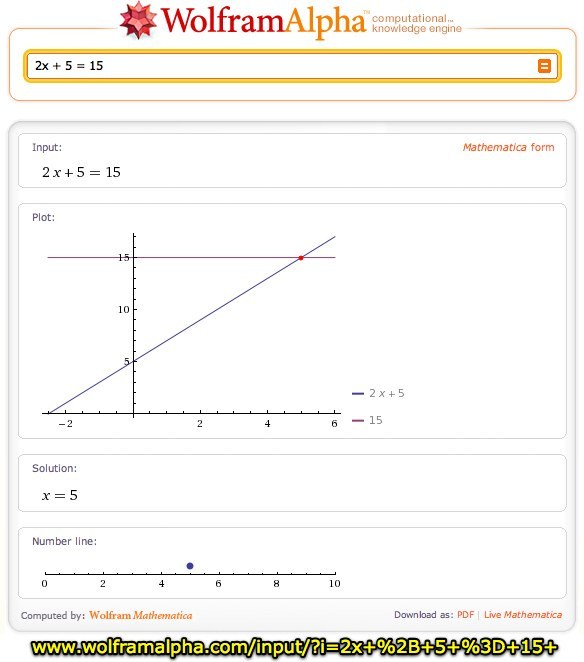Artificial Intelligence helps students fool teachers

Denise Garcia knows that sometimes her students cheat on her, but the situation she revealed in February was completely unusual. Garcia, a mathematics teacher in West Hartford, Connecticut, accidentally included an atypically complex equation in a set of tasks for her math class in an institute program. However, in some way, several people from the class, where 15 students are engaged, managed to solve it correctly. These students demonstrated their work with the solution of the equation, refuting the usual scheme of disclosure of cheating.
Garcia was confused, but then she recalled one conversation that had occurred several years before. Some of the former students told her about the online tool Wolfram | Alpha, which can deal with complex equations in a few seconds. He gives both answers and consecutive steps to achieve answers, so the cheaters could not be caught by copying the result into homework.
For years, students have used CliffsNotes to speed up the reading of books [a series of publications containing a brief retelling of famous works / approx. trans. ], SparkNotes for help during class discussions of the material [ auxiliary teaching materials in various sciences / approx. trans. ], Wikipedia to fill their work with historical references. Today's students have more powerful tools - namely, Wolfram | Alpha, a program that uses AI to perfectly solve equations, which is impossible to catch. Wolfram | Alpha uses natural language processing technology, and students receive answers from it faster than from the teacher, more precisely than when copying someone else's work, and more easily than when solving problems on their own.
Since its release, Wolfram | Alpha has leaked through the learning system and penetrated the homework of college and high school students. Using Wolfram | Alpha is difficult to track down, and in the hands of ambitious students, its ideal solutions lead to unexpected consequences. It works by breaking the problem down into pieces, whether it is math or a question like “Where is the center of the USA?”, And then building cross-links between these pieces and a huge, constantly expanding, data library. This data includes geodetic information, chemical compounds, the human genome, the history of weather measurements, thousands of other topics that, when gathered together, can be used to search for an answer.
The system is limited only by the scope of its data - it cannot interpret any question. She also can not answer in a natural language that a person would take for the spoken. This is a common difficulty for AI. Even Siri, which relies heavily on Mathematica - another product of the Wolfram Research group, the engine behind Wolfram | Alpha - can only answer questions according to programmed scenarios, like in the game Mad Libs , composing answers and giving them to the screen or through the speaker .
Using Wolfram | Alpha is similar to using Google search, but Wolfram | Alpha gives you specific answers, rather than an endless list of pages with potentially question-related results. Anyone can go to the site Wolfram | Alpha, drive a question or equation and get an answer. If you are trying to solve the equation x 2 + 5x + 6 = 0, Wolfram | Alpha will give you a graph, alternative forms and solutions. If you need a step-by-step explanation, a professional version will be available for you at $ 6.99 a month, and discounts are available for students and teachers.
I first heard about Wolfram | Alpha in my parents' kitchen. My father returned from work at a private school in Dobbs Ferry, New York. He threw his bag on the floor and asked me what I thought of Wolfram | Alpha. Earlier on the same day, the teachers expressed their complaints to him, upset that their students were using the specified tool. They said it was a scam. My father left work, being unsure how to act in this situation. Should the school take action against Wolfram | Alpha? Or does the school need to catch up to new trends in education?
I didn’t hear anything about her then, but my Facebook post showed that many of my friends know about her — especially those who study math. Some used it to cope with algebra in college, and some still use it in their work as engineers or numerical analysts. The appearance of Wolfram | Alpha went unnoticed by the humanities in my mind, and for millions of people this system became everyday. They say that there is nothing wrong with asking for answers to technologies. At the same time, all as one said they did not want the fact that they used Wolfram | Alpha to become public.
Although Wolfram | Alpha appeared as a tool for educational assistance - a way to study the equation from the inside - academic circles found themselves in a position where they do not know what to do next. What some consider fraud, others are advancing as a huge step forward in the field of knowledge, training and the value of education in general. They say that Wolfram | Alpha has a future. Not surprisingly, its creator agrees with this.
Stephen Wolfram, the man who invented Wolfram | Alpha, could not cope with the division into a bar and could not learn the multiplication table until he turned 40. His own problems with mathematics became inspirations to the creation of Wolfram | Alpha, released in 2009. The main passion of Wolfram has always been physics. By the age of 12, he compiled a physical dictionary, then wrote three (yet unpublished) books, and by 15 had already published scientific papers.
But despite his abilities as a prodigy of science, mathematics has always been an obstacle for him. He could come up with concepts, but it was difficult for him to perform the calculations. He solved this problem with a computer. Having programmed him to solve equations and search for patterns in the data, he could leave the calculations to the machine and concentrate on science. It worked. By 1981, Wolfram became the youngest of all MacArthur scholarships . He was 21 years old.
However, it was precisely the tool that helped Wolfram build his reputation as a physicist who drew him away from science. Tungsten captured integrated systems and the problems of using computers to study them. Five years after receiving MacArthur's scholarship, Wolfram began developing Mathematica, and in 1988, Wolfram Research announced the release of its flagship product.
Wolfram never planned his instrument to become a snobbish version of CliffsNotes, but that doesn’t particularly bother him. “Mechanical mathematics,” Wolfram asserts, “is at a very low level of exact thinking.” He believes that we should concentrate on computational thinking — which he describes as “trying to formulate thoughts so that they can be explained to a reasonably smart computer.” This method is also called computational mathematics. In fact, knowledge of algebra in today's technological world will not give you anything special, but knowing how to ask a computer to make algebra for you will greatly help you. If students move in this direction, then, in his opinion, they simply outpace the trend.

Alan Joyce, Wolfram Alpha's director of content development, says fraud is “an absolutely wrong way to describe what we do.” But company employees understand what the teachers might not like. Historically, learning had to emphasize manual computation, says John Dickson, program manager at Wolfram Alpha. Then there was no technology that could be relied upon, and when they started to appear, they were unreliable. And only recently computers began to calculate everything automatically and with accuracy, and it took time for teachers and their students to catch up with this trend. According to Dixon, Wolfram Research wants to work with teachers such as Garcia who are frustrated with the tool, and help them understand how this tool can help their students.
Indeed, people who develop this tool consider it an educational equalizer, able to give students that no one helps at home with studies — neither tutors nor educated parents — access to virtually a personal teacher. She also has great potential for use during her studies. The “show steps” button, which opens the way to the answer, allows teachers to break the task down into components, and not get confused in mechanics. Problem generator can create tasks based on real data. “When you begin to demonstrate the full potential of a teacher,” says Dixon, “you can clearly see where his eyes light up.”
For every teacher who crossed into Dixon’s camp, there are many students who have been there for a while. As Alexander Feiner, a first-year student and enthusiastic engineer, told me, Wolfram | Alpha is an aid to study, not a way to avoid work. It is precisely at this rate that Dixon insists on the use of the tool after school.
And yet, the prevailing view that Wolfram | Alpha is a type of fraud does not go anywhere. Most of the problem is related to the nature of homework. If the goal of homework is to develop a better understanding of the concepts presented in the classroom, then Joyce is sure that teachers should consider Wolfram | Alpha as a valuable tool. After all, it’s not that Wolfram | Alpha helped students "complete the math course by doing their homework for them," he says, "she helped them to really understand what they were doing." Dixon is confident that Wolfram | Alpha can increase the confidence of students who do not think they have a mathematical mindset. Homework is needed not in order to learn calculations, but in order to learn how to seek and understand the answer, regardless of the method of calculation.
And, apparently, it is along this path that learning develops. At one time, training was associated only with cramming as much information as possible into the human brain. Information was limited and expensive, and the smartest people were simply the most voluminous and organized archival cabinets. Today is the opposite. “The concept of education as the transfer of information from experts to beginners — and the requirements for beginners to reproduce this information, mechanically repeat it as evidence of learning — is completely divorced from the realities of 2017,” said David Helfand, a professor of astronomy at Columbia University.
The technology is not going anywhere: before, students copied the answers from the last pages of the book or shared the solution of a set of tasks into several people, and now they, too, will not give up using Wolfram | Alpha at the request of the teacher. Even Garcia can imagine a future in which Wolfram | Alpha has a place. “I think that in an ideal world, teachers, and I among them, need to better cope with the introduction of technologies and the search for ways to use them productively,” she says.
Just as robots transformed manufacturing, tools like Wolfram | Alpha force us to rethink the educational system, forcing it to rise to new technological heights. Either we rebuild our schools so that they can adopt tools like Wolfram | Alpha, or we risk becoming living artifacts in a rapidly developing world.
All Articles